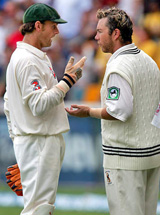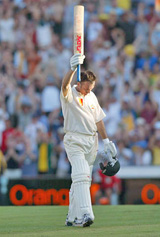ARTICLES
SLEDGING - YES AND NO
- By VVSLaxman
Sledging, as far as I am concerned, is all about distracting the opposition. It
has always been an integral part of the game at every level, be it junior or
senior. I believe that there is nothing with it. It can help a team to show its
opponents that it means business. However, one can be aggressive without being
abusive.

Aussie Adam Gilchrist (left)
and Kiwi Craig McMillan try
to settle an on-field spat at
the end of the day's play
at Brisbane in 2004-05
My first exposure to sledging was many years ago, in an under-13 game for
Hyderabad against Kerala. I was timing the ball well, and found myself at the
receiving end of some nasty remarks by the Kerala bowlers and fielders. Though
I was shocked initially, I decided to concentrate on my batting. I went on to
score 153 and that was easily the best response I could have given. Since then,
I have never really been bothered by what anyone says to me out on the field.
What I have always told myself in such situations is that the opposition is
struggling to get me out, which is why they are resorting to such desperate
tactics to break my concentration. My approach has always been to maintain my
focus and 'talk' to them with my bat! Several cricketers do the same.
Of course, not all players think alike. Besides those who prefer the 'ignore-and-carry-on' approach, there are players who retaliate verbally after being subjected to some uncomplimentary remarks by the fielding team. There is a flip-side to acting, or should I say reacting, in this manner. A batsman who loses his wicket after losing his cool due to the caustic language of the fielding side can look foolish. After all, that is exactly what his adversaries wanted him to do!
Sledging, if practised well and intelligently, can certainly help in getting some batsmen out. As I have already stated above, everything is acceptable as long as it doesn't transgress 'personal' limits. With the ICC Match Referee keeping a keen eye on the proceedings, most teams of the modern era know what to say and where to draw the line.
Players know which batsman is susceptible to sledging and who isn't. These individuals are then given the treatment that makes them uncomfortable. So, those who do not like chatter are subjected to it, while those who are not affected by it are generally left alone. There are also some complex characters who bat well when they are 'sledged'! Steve Waugh was a classic example. Believe it or not, he would start an argument with the close-in fielders just to get himself fired up! More often than not, he succeeded! Whenever he was around, our strategy was to remain silent!
Of course, not all players think alike. Besides those who prefer the 'ignore-and-carry-on' approach, there are players who retaliate verbally after being subjected to some uncomplimentary remarks by the fielding team. There is a flip-side to acting, or should I say reacting, in this manner. A batsman who loses his wicket after losing his cool due to the caustic language of the fielding side can look foolish. After all, that is exactly what his adversaries wanted him to do!
Sledging, if practised well and intelligently, can certainly help in getting some batsmen out. As I have already stated above, everything is acceptable as long as it doesn't transgress 'personal' limits. With the ICC Match Referee keeping a keen eye on the proceedings, most teams of the modern era know what to say and where to draw the line.
Players know which batsman is susceptible to sledging and who isn't. These individuals are then given the treatment that makes them uncomfortable. So, those who do not like chatter are subjected to it, while those who are not affected by it are generally left alone. There are also some complex characters who bat well when they are 'sledged'! Steve Waugh was a classic example. Believe it or not, he would start an argument with the close-in fielders just to get himself fired up! More often than not, he succeeded! Whenever he was around, our strategy was to remain silent!

Steve Waugh - He would
talk to the fielders to get himself charged up!.
If a member of the opposing side has sledged us during our innings, we make it a point to give it back to him when he comes in to bat, without getting personal. The idea is to make him realize that he had made a mistake. On our tour of New Zealand in 2002-03, we went hard at Craig McMillan, who had been giving us a tough time. So handsomely did we 'pay him back with interest' that he ended up requesting us to pardon him and let him concentrate on his batting!
My advice to youngsters would be to constantly encourage the bowlers and have a good body language. This will help a player improve his intensity, which in turn will directly affect the performance of the team. Comments like "He is scared, now get him out", or "One more wicket, and we have won this game" or 'You can do it for us" can play their part in building the confidence of one's teammates. However, one should refrain from making personal comments that may hurt the opponent and bring the game into disrepute.
Remember - we may have entered the 21st century, but cricket is still a Gentlemen's game!